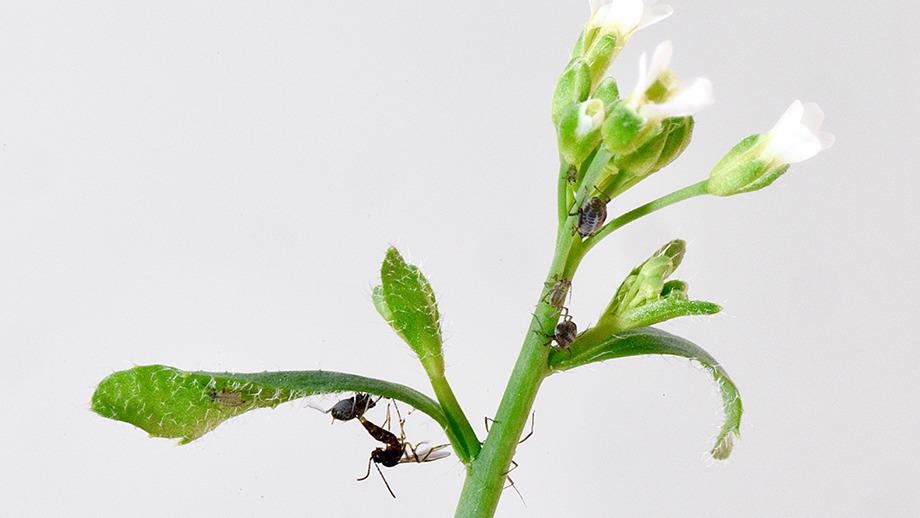A study team from the University of Zurich did a lab experiment with a plant and its related insect habitat to see if a single gene could alter an entire ecosystem. They discovered that plants with a specific gene mutation promote an ecosystem with more insect species. The exploration of a “keystone gene” like this could have a significant influence on current biodiversity conservation efforts.
 Plants with a non-functional AOP2 gene foster the coexistence of aphids and the aphids’ natural enemy, a parasitoid wasp (pictured here parasitizing the aphid. Image Credit: Matthias Furler
Plants with a non-functional AOP2 gene foster the coexistence of aphids and the aphids’ natural enemy, a parasitoid wasp (pictured here parasitizing the aphid. Image Credit: Matthias Furler
Robert Paine, a US ecologist, discovered more than 50 years ago on the coastline of a rocky tide pool that removing a single species from an ecosystem might radically alter its structure and function. He found that starfish function as a keystone species, ensuring the coexistence of different species in the rocky intertidal zone by their presence and position as a top predator.
Plant defense genes tested with a simplified ecosystem in the lab
Ecologists and geneticists from the University of Zurich (UZH) and the University of California, Davis have discovered that a single gene mutation can change the structure and operation of an ecosystem substantially.
The research demonstrates that a gene can influence the longevity of interacting species in an ecological community in addition to encoding information that defines an organism’s fitness. The study was published in Science.
Jordi Bascompte, a professor at the University of Zurich’s Department of Evolutionary Biology and Environmental Studies, and his colleagues made their scientific breakthrough in the lab using an experimental ecosystem that included a predator (a parasitic wasp), two herbivores (aphids), and the genetic model organism Arabidopsis thaliana.
“Keystone gene” can prevent the ecosystem from collapsing
Three plant genes that regulate the plant’s inherent arsenal of chemical defenses against herbivores were investigated. They discovered that herbivores and predators in their lab community were more likely to flourish on plants with a single gene mutation termed AOP2.
This natural mutation at AOP2 not only affected the plant’s chemistry but also made the plant grow faster, which in turn helped the herbivores and predator coexist, thereby preventing the ecosystem from collapsing.”
Matt Barbour, Study First Author and Scientist, University of Zurich
AOP2 operates as a “keystone gene” that is important for the sustainability of the experimental ecosystem, much as a keystone species like the starfish.
Impacts on current biodiversity conservation
The identification of a keystone gene will almost certainly have ramifications for biodiversity conservation in a changing environment. When it comes to anticipating the repercussions of genetic change on biodiversity persistence across scales, information from genetics and ecological systems should be included.
Individuals with various gene variants could be mixed in with current populations to make ecosystems more diversified and resilient. Furthermore, if not thoroughly investigated initially, a seemingly minor genetic mutation could result in a cascade of unforeseen repercussions for ecosystems.
We’re only just beginning to understand the implications of genetic change on how species interact and coexist. Our findings show that the current loss of genetic diversity may have cascading effects that lead to abrupt and catastrophic shifts in the persistence and functioning of terrestrial ecosystems.”
Matt Barbour, Study First Author and Scientist, University of Zurich
Source:
Journal reference:
Barbour, M. A., et al. (2022) A keystone gene underlie the persistence of an experimental food web. Science. doi.org/10.1126/science.abf2232.